
A giant planet, sometimes referred to as a jovian planet, is a diverse type of planet much larger than Earth. Giant planets are usually primarily composed of low-boiling point materials (volatiles), rather than rock or other solid matter, but massive solid planets can also exist. There are four such planets in the Solar System: Jupiter, Saturn, Uranus, and Neptune. Many extrasolar giant planets have been identified.
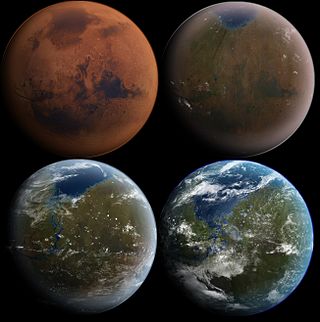
Terraforming or terraformation ("Earth-shaping") is the hypothetical process of deliberately modifying the atmosphere, temperature, surface topography or ecology of a planet, moon, or other body to be similar to the environment of Earth to make it habitable for humans to live on.
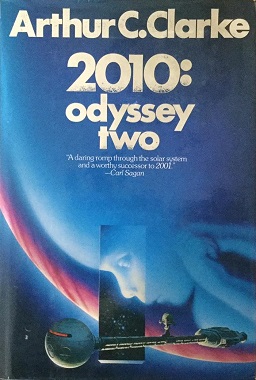
2010: Odyssey Two is a 1982 science fiction novel by British writer Arthur C. Clarke. It is the sequel to his 1968 novel 2001: A Space Odyssey, though Clarke changed some elements of the story to align with the film version of 2001.

Jupiter is the fifth planet from the Sun and the largest in the Solar System. It is a gas giant with a mass more than 2.5 times that of all the other planets in the Solar System combined and slightly less than one-thousandth the mass of the Sun. Its diameter is eleven times that of Earth, and a tenth that of the Sun. Jupiter orbits the Sun at a distance of 5.20 AU (778.5 Gm), with an orbital period of 11.86 years. It is the third-brightest natural object in the Earth's night sky, after the Moon and Venus, and has been observed since prehistoric times. Its name derives from that of Jupiter, the chief deity of ancient Roman religion.
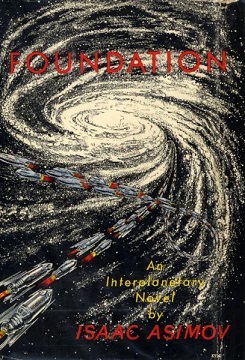
The Foundation series is a science fiction book series written by American author Isaac Asimov. First published as a series of short stories and novellas in 1942–50, and subsequently in three books in 1951–53, for nearly thirty years the series was widely known as The Foundation Trilogy: Foundation (1951), Foundation and Empire (1952), and Second Foundation (1953). It won the one-time Hugo Award for "Best All-Time Series" in 1966. Asimov later added new volumes, with two sequels, Foundation's Edge (1982) and Foundation and Earth (1986), and two prequels, Prelude to Foundation (1988) and Forward the Foundation (1993).
The Childe Cycle is an unfinished series of science fiction novels by American writer Gordon R. Dickson. The name Childe Cycle is an allusion to "Childe Roland to the Dark Tower Came", a poem by Robert Browning, which provided inspiration for elements in the work. The series is sometimes referred to as the Dorsai series, after the Dorsai people who are central to it. The related short stories and novellas all center on the Dorsai, primarily members of the Graeme and Morgan families.

Space and survival is the idea that the long-term survival of the human species and technological civilization requires the building of a spacefaring civilization that utilizes the resources of outer space, and that not doing this might lead to human extinction. A related observation is that the window of opportunity for doing this may be limited due to the decreasing amount of surplus resources that will be available over time as a result of an ever-growing population.

Inconstant Moon is a science fiction short story collection by American author Larry Niven that was published in 1973. "Inconstant Moon" is also a 1971 short story that is included in the collection. The title refers to "O, swear not by the moon, th' inconstant moon", a quote from the balcony scene in William Shakespeare's Romeo and Juliet. The collection was assembled from the US collections The Shape of Space and All the Myriad Ways.

Planetary habitability is the measure of a planet's or a natural satellite's potential to develop and maintain an environment hospitable to life. Life may be generated directly on a planet or satellite endogenously. Research suggests that life may also be transferred from one body to another, through a hypothetical process known as panspermia. Environments do not need to contain life to be considered habitable nor are accepted habitable zones (HZ) the only areas in which life might arise.
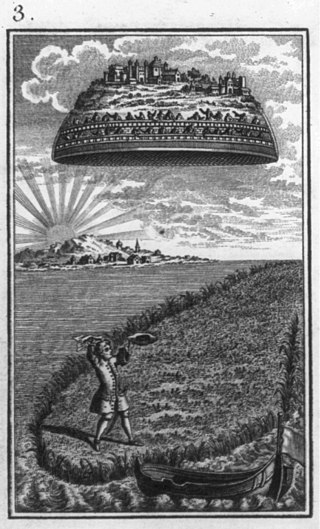
In science fiction and fantasy, floating cities and islands are a common trope, ranging from cities and islands that float on water to ones that float in the atmosphere of a planet by purported scientific technologies or by magical means. While very large floating structures have been constructed or proposed in real life, aerial cities and islands remain in the realm of fiction.

Saturn has made appearances in fiction since the 1752 novel Micromégas by Voltaire. In the earliest depictions, it was portrayed as having a solid surface rather than its actual gaseous composition. In many of these works, the planet is inhabited by aliens that are usually portrayed as being more advanced than humans. In modern science fiction, the Saturnian atmosphere sometimes hosts floating settlements. The planet is occasionally visited by humans and its rings are sometimes mined for resources.
The Grand Tour is a series of novels written by American science fiction author Ben Bova.

"Founding Father" is a science fiction short story by American writer Isaac Asimov. It was first published in the October 1965 issue of Galaxy Science Fiction, and reprinted in the 1975 collection Buy Jupiter and Other Stories. It was inspired by a cover painting of a space-helmeted face backed by several crosses, provided by the magazine's editor, Frederik Pohl.

Wheelers is a hard science fiction novel written by English mathematician Ian Stewart and reproductive biologist Jack Cohen. The book was originally released in hardcover form in the year 2000, and a more common paperback printing was begun in 2001. It has enjoyed modest commercial success and is perhaps best known for its conceptions of alien zoology and intelligence—hallmarks of Cohen's work as a consultant on exobiology for books, movies, and television.
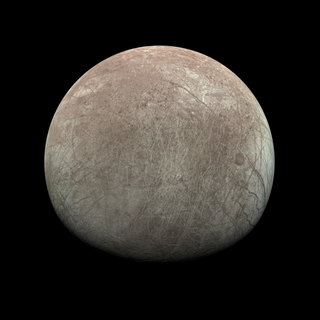
The habitability of natural satellites is the potential of moons to provide habitats for life, though it is not an indicator that they harbor it. Natural satellites are expected to outnumber planets by a large margin and the study of their habitability is therefore important to astrobiology and the search for extraterrestrial life. There are, nevertheless, significant environmental variables specific to moons.

WASP-17b, officially named Ditsö̀, is an exoplanet in the constellation Scorpius that is orbiting the star WASP-17. Its discovery was announced on 11 August 2009. It is the first planet discovered to have a retrograde orbit, meaning it orbits in a direction counter to the rotation of its host star. This discovery challenged traditional planetary formation theory. In terms of diameter, WASP-17b is one of the largest exoplanets discovered and at half Jupiter's mass, this made it the most puffy planet known in 2010. On 3 December 2013, scientists working with the Hubble Space Telescope reported detecting water in the exoplanet's atmosphere.
The Foundation universe is the future history of humanity's colonization of the galaxy, spanning nearly 25,000 years, created through the gradual fusion of the Robot, Galactic Empire, and Foundation book series written by American author Isaac Asimov.

A gas giant is a giant planet composed mainly of hydrogen and helium. Jupiter and Saturn are the gas giants of the Solar System. The term "gas giant" was originally synonymous with "giant planet". However, in the 1990s, it became known that Uranus and Neptune are really a distinct class of giant planets, being composed mainly of heavier volatile substances. For this reason, Uranus and Neptune are now often classified in the separate category of ice giants.
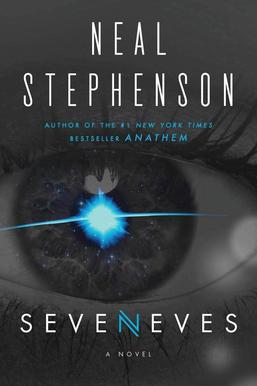
Seveneves is a science fiction novel by Neal Stephenson published in 2015. The story tells of the desperate efforts to preserve Homo sapiens in the wake of apocalyptic events on Earth after the unexplained disintegration of the Moon and the remaking of human society as a space-based civilization after a severe genetic bottleneck.

The Murderbot Diaries is a science fiction series by American author Martha Wells, published by Tor Books. The series is told from the perspective of the titular cyborg, a "SecUnit" owned by a futuristic megacorporation. Murderbot manages to free itself from enslavement, but instead of killing its masters, it staves off the boredom of security work by watching media. As it spends more time with a series of caring entities, it starts developing friendships and emotional connections, which it finds inconvenient.















